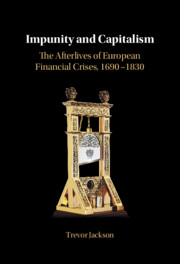5 - Recasting Financial Capitalism, 1796–1821
from Part II - Preface
Published online by Cambridge University Press: 08 September 2022
Summary
Between 1797 and 1815, Britain and France each developed modern central banks, albeit in very different forms. The Bank of England’s powers expanded enormously after the suspension of gold convertibility in 1797, and it also developed a vast system of investigation and prosecution of forgery and counterfeiting, whose records form the evidentiary core of the chapter. The Bank used its powers to protect itself, but also to aid in broader English governance, helping to produce a modern money-using financial public. As with the aftermath of 1720, the Bank’s powers produced widespread political condemnation, especially accusations of illegitimate elite conspiracy. In France, the brief chaos of free banking was replaced by the centralized Bank of France, mostly under government control and with limited policy discretion. In both cases, impunity was institutionalized as a function of governance, delegated to a private bank with political obligations. These new institutions, exercising new forms of monetary policy, would reconstitute the operation of international financial system after 1815.
Keywords
- Type
- Chapter
- Information
- Impunity and CapitalismThe Afterlives of European Financial Crises, 1690–1830, pp. 177 - 214Publisher: Cambridge University PressPrint publication year: 2022

